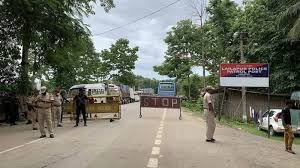His case pending in Supreme Court, ex-govt teacher ‘picked up from Assam home and pushed into Bangladesh’, says family

A former government teacher from Assam has reportedly been deported to Bangladesh, even though his legal case is still pending in the Supreme Court. His family has raised serious concerns about the legality and humanity of this action.
Background of the Case
Khairul Islam, 51, worked as a government school teacher in Assam’s Morigaon district. In 2016, the Assam Foreigners Tribunal declared him a foreigner. The Gauhati High Court confirmed this decision in 2018. He was detained for two years but released on bail in 2020, after the Supreme Court ordered a stay on coercive actions.
Despite the pending appeal, Assam police reportedly detained Islam from his home on May 23, 2025. His family says police took him to the Matia detention center. On May 26, police allegedly pushed him across the border into Bangladesh with 13 other people declared foreigners.
Deportation Incident and Family’s Response
This deportation has shocked many, especially because the Supreme Court had issued an interim order preventing any coercive action against Islam until the appeal finished. A video soon appeared showing Islam in a field in Bangladesh’s Kurigram district. His wife and daughter recognized him and expressed deep distress. They wondered how the authorities could deport him while his case was still active.
This family’s pain reflects the struggles faced by many in Assam. People with ties to Bangladesh often fight long legal battles to prove their citizenship. These cases span years and cause great uncertainty.
Legal and Political Context
Assam set up the Foreigners Tribunal to identify illegal immigrants, mostly from Bangladesh. Citizenship remains a sensitive issue in the state. It influences politics and community relations deeply.
The Supreme Court has demanded due process and humane treatment for those declared foreigners. However, cases like Islam’s show ongoing problems in enforcing these standards. Deportations often face delays, and many remain in legal limbo.
The Border Security Force (BSF) has not directly commented on Islam’s deportation. However, it said it stopped an infiltration attempt by a group of Bangladeshi nationals around the same time. Reports say the 14 deported individuals were left stranded in a border no man’s land, with neither India nor Bangladesh accepting them initially.
Human Rights and Ethical Concerns
This case raises serious human rights questions. Deporting someone with a pending legal appeal violates the judicial process. It also risks the person’s safety and dignity. Human rights groups, political parties, and civil society have criticized the treatment of people declared foreigners in Assam.
The All India United Democratic Front (AIUDF) called the deportation “inhuman” and submitted a memorandum to the state governor. They demanded immediate action to protect residents’ rights, regardless of citizenship status.
Experts warn that forced deportations without fair hearings breach international human rights norms. Many deportees face dangerous conditions. They might end up stranded or face hostility in their supposed home countries. These actions could worsen humanitarian crises and isolate vulnerable groups.
Broader Implications for Assam and India
Khairul Islam’s case highlights the ongoing citizenship challenges in Assam. The state has dealt with migration from Bangladesh for decades. This history has caused tension and complicated politics.
In 2019, the Citizenship Amendment Act (CAA) aimed to offer citizenship paths to some minority groups from neighboring countries. But it also sparked protests and debates about inclusivity.
Assam’s National Register of Citizens (NRC) sought to identify legal residents. Yet thousands were left out, many facing detention or deportation orders. Cases like Islam’s show the human toll of these policies. They reveal how procedural safeguards sometimes fail.
The Way Forward: Legal and Compassionate Solutions
Legal experts urge strict adherence to fair hearings and protection of human dignity. The Supreme Court must balance state security and individual rights.
The Assam government, civil society, and human rights groups should improve transparency. They must speed up legal processes and ensure humane treatment of those declared foreigners. Support services, legal aid, and diplomatic talks with Bangladesh can ease humanitarian concerns.
For Khairul Islam and others, the future remains uncertain. His family’s plea reminds us that we need compassionate and lawful solutions. These should respect court processes and protect vulnerable people caught in citizenship disputes.
Conclusion
The alleged deportation of Khairul Islam, a former government teacher from Assam, while his Supreme Court case remains pending, raises serious legal and ethical issues. It exposes the challenges Assam faces in balancing security, immigration, and human rights.
India’s ongoing debates about identity, belonging, and citizenship must consider the human impact. Stories like Islam’s urge policymakers to choose justice, empathy, and law. Protecting the dignity and rights of all individuals should be the foundation of any democracy, especially in sensitive cases like these.






